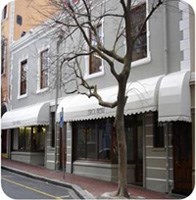
Top stories






More news









Logistics & Transport
Uganda plans new rail link to Tanzania for mineral export boost















It is not just the international name brands that have tapped into the growing appetite for luxury goods amongst the growing affluent class. Home-grown high-end retailers are claiming their piece of the luxury goods market with their local production and curation of goods ranging from fashion and jewellery to leather goods, amongst other offerings.
High-end retailers in the Cape Town CBD in particular have been meeting the demand of big-spenders who flock to the Central City of Cape Town for bespoke pieces and luxury items not readily available in their home cities such as Lagos or Luanda, while Capetonians have also turned their discerning shopping gaze to local retailers for one-of-a-kind pieces.
"The Cape Town CBD is well-positioned to offer shoppers a retail experience that is fast matching that of some of the world's most recognised high-end shopping districts," says Rob Kane, chairperson of the Central City Improvement District (CCID).
From London's Bond or Sloane Street, Bahnhofstrasse in Zürich, Avenue Montaigne in Paris, or even the Ginza district in Tokyo, the allure of the most famous global high-end retail locations often lies in their on-the-street, "pavement-access" locations and in the distinctive neighbourhoods in which they are located.
"While some high-end retailers may opt for a mall environment, the retailers in the Cape Town Central City - much like their global counterparts - have opted to let the surrounds of the CBD form part of the overall package and retail experience for their clientele," says Kane.
Elbeth Gillis, couture and wedding dress designer based in Bloem Street, says the reason she is not located in a shopping centre is that she has the freedom to set her studio's operating hours and the rent is considerably less. "We also prefer the vibe in the Central City. There are a lot of small designer-type stores that complement each other, which turns the location into a creative hub."
On Bree Street is Klûk CGDT, the home of the design team of Malcolm Klûk and Christiaan Gabriel du Toit. Housed behind an eye-catching facade painted an avant garde black ("Actually," says Klûk, "the colour is aniseed"), the duo had their eye on Bree Street for a number of years before purchasing the premises. "Bree Street spoke to us instinctively as the place to be," says Klûk. "And the 1930s influence of the building also speaks to our distinctive brand of design."
Prins and Prins, a leading supplier of loose diamonds as well as other stones and fine bespoke jewellery, is located in the magnificent Huguenot House, on the corner of Loop and Hout Streets. This 18th century building, authentically restored and steeped in grandeur and heritage, is one of the reasons the retailer has not moved in 20 years.
"Over the years, we've seen more people increasingly looking to spend their money in an up-market, relaxed yet professional establishment where good value and service are key," says Stéfan Doveton-Moore, marketing and sales consultant at Prins and Prins. "At the same time both locals and international visitors have become increasingly aware of Cape Town's rich history and heritage and are exploring the city looking for hidden gems in the CBD. We are perfectly positioned to be a part of that unique experience."
"The retail offering of any CBD is one that needs to be diverse enough to cater to different markets. There is no denying the growing numbers of discerning luxury shoppers both locally and internationally, and the growing bouquet of high-end retailers in the Cape Town CBD is poised not only to meet the demand of the booming luxury sector, but to thrive with it as well," concludes Kane.